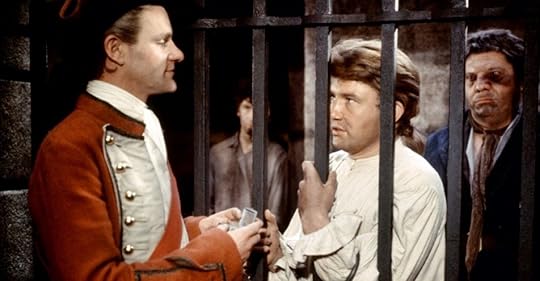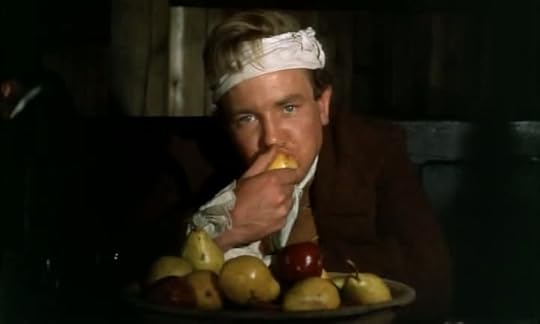What do you think?
Rate this book


877 pages, Paperback
First published February 28, 1749
…the Excellence of the mental Entertainment consists less in the Subject, than in the Author’s Skill in well dressing it up.
Mr. Partridge acted for some Time on the defensive only; indeed he attempted only to guard his Face with his Hands; but as he found that his Antagonist abated nothing of her Rage, he thought he might, at least, endeavour to disarm her, or rather to confine her Arms; in doing which, her Cap fell off in the Struggle, and her Hair being too short to reach her Shoulders, erected itself on her Head; her Stays likewise, which were laced through one single Hole at the Bottom, burst open; and her Breasts, which were much more redundant than her Hair, hung down below her Middle; her Face was likewise marked with the Blood of her Husband; her Teeth gnashed with Rage; and Fire, such as sparkles from a Smith’s Forge, darted from her Eyes.
‘Dearest Sophia, whatever it costs me, I will renounce you; I will give you up: I will tear all such Hopes from my Heart, as are inconsistent with your real Good. My Love I will ever retain, but it shall be in Silence; it shall be at a Distance from you; it shall be in some foreign Land; from whence no Voice, no Sigh of my Despair, shall ever reach and disturb your Ears.’






Fielding being mentioned, Johnson exclaimed, ‘he was a blockhead;’ and upon my expressing astonishment at so strange an assertion, he said ‘What I mean by his being a blockhead is that he was a barren rascal.’ BOSWELL. ‘Will you not allow, Sir, that he draws very natural pictures of human life?’ JOHNSON. ‘Why, Sir, it is of very low life.’
James Boswell, Life of Samuel Johnson
I have been Tom Jones (a child’s Tom Jones, a harmless creature) for a week altogether.
Charles Dickens, David Copperfield

Comfort me by a solemn assurance, that when the little parlour in which I sit at this instant shall be reduced to a worse furnished box, I shall be read with honour by those who never knew nor saw me, and whom I shall neither know nor see.
The only supernatural agents which can in any manner be allowed to us moderns, are ghosts; but of these I would advise an author to be extremely sparing.
As a genius of the highest rank observes in his fifth chapter of the Bathos, “The great art of all poetry is to mix truth with fiction, in order to join the credible with the surprizing.”
To invent good stories, and to tell them well, are possibly very rare talents, and yet I have observed few persons who have scrupled to aim at both: and if we examine the romances and novels with which the world abounds, I think we may fairly conclude, that most of the authors would not have attempted to show their teeth (if the expression may be allowed me) in any other way of writing; nor could indeed have strung together a dozen sentences on any other subject whatever.
In fact, if there be enough of goodness in a character to engage the admiration and affection of a well-disposed mind, though there should appear some of those little blemishes quas humana parum cavit natura, they will raise our compassion rather than our abhorrence.
These screams soon silenced the squire, and turned all his consideration towards his daughter, whom he loved so tenderly, that the least apprehension of any harm happening to her, threw him presently into agonies; for, except in that single instance in which the whole future happiness of her life was concerned, she was sovereign mistress of his inclinations.
Our present women have been taught by their mothers to fix their thoughts only on ambition and vanity, and to despise the pleasures of love as unworthy their regard; and being afterwards, by the care of such mothers, married without having husbands, they seem pretty well confirmed in the justness of those sentiments; whence they content themselves, for the dull remainder of life, with the pursuit of more innocent, but I am afraid more childish amusements, the bare mention of which would ill suit with the dignity of this history.
Now if an absolute monarch, with all these great and rare qualifications, should be allowed capable of conferring the greatest good on society; it must be surely granted, on the contrary, that absolute power, vested in the hands of one who is deficient in them all, is likely to be attended with no less a degree of evil.
In this case it will be much wiser to submit to a few inconveniencies arising from the dispassionate deafness of laws, than to remedy them by applying to the passionate open ears of a tyrant.
In fact, poor Jones was one of the best-natured fellows alive, and had all that weakness which is called compassion, and which distinguishes this imperfect character from that noble firmness of mind, which rolls a man, as it were, within himself, and like a polished bowl, enables him to run through the world without being once stopped by the calamities which happen to others.
To say the truth, it is often safer to abide by the consequences of the first blunder than to endeavour to rectify it; for by such endeavours we generally plunge deeper instead of extricating ourselves;
He had been bred, as they call it, a gentleman; that is, bred up to do nothing;
so he rambled about some time before he could even find his way to those happy mansions where fortune segregates from the vulgar those magnanimous heroes, the descendants of antient Britons, Saxons, or Danes, whose ancestors, being born in better days, by sundry kinds of merit, have entailed riches and honour on their posterity.
I will venture to say the highest life is much the dullest, and affords very little humour or entertainment. The various callings in lower spheres produce the great variety of humorous characters; whereas here, except among the few who are engaged in the pursuit of ambition, and the fewer still who have a relish for pleasure, all is vanity and servile imitation. Dressing and cards, eating and drinking, bowing and courtesying, make up the business of their lives.
For men of true learning, and almost universal knowledge, always compassionate the ignorance of others; but fellows who excel in some little, low, contemptible art, are always certain to despise those who are unacquainted with that art.
he generally left his hearers to understand more than he expressed; nay, he commonly gave them a hint that he knew much more than he thought proper to disclose. This last circumstance alone may, indeed, very well account for his character of wisdom; since men are strangely inclined to worship what they do not understand. A grand secret, upon which several imposers on mankind have totally relied for the success of their frauds.
Jones then fell a-laughing, and asked Partridge, “if he was not ashamed, with so much charity in his mouth, to have no charity in his heart. Your religion,” says he, “serves you only for an excuse for your faults, but is no incentive to your virtue.
Again, though there may be some faults justly assigned in the work, yet, if those are not in the most essential parts, or if they are compensated by greater beauties, it will savour rather of the malice of a slanderer than of the judgment of a true critic to pass a severe sentence upon the whole, merely on account of some vicious part.
Cruel indeed would it be if such a work as this history, which hath employed some thousands of hours in the composing, should be liable to be condemned, because some particular chapter, or perhaps chapters, may be obnoxious to very just and sensible objections.